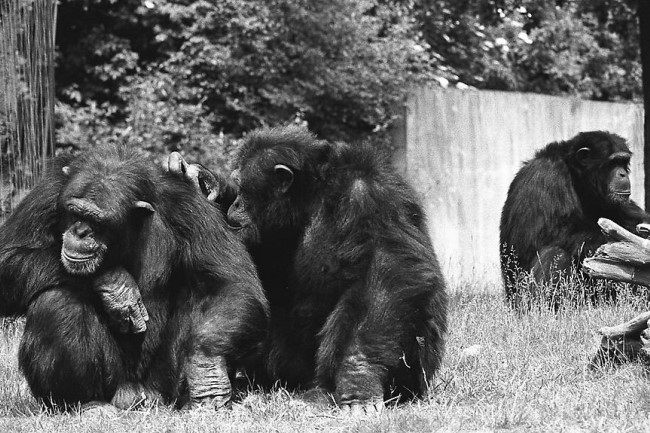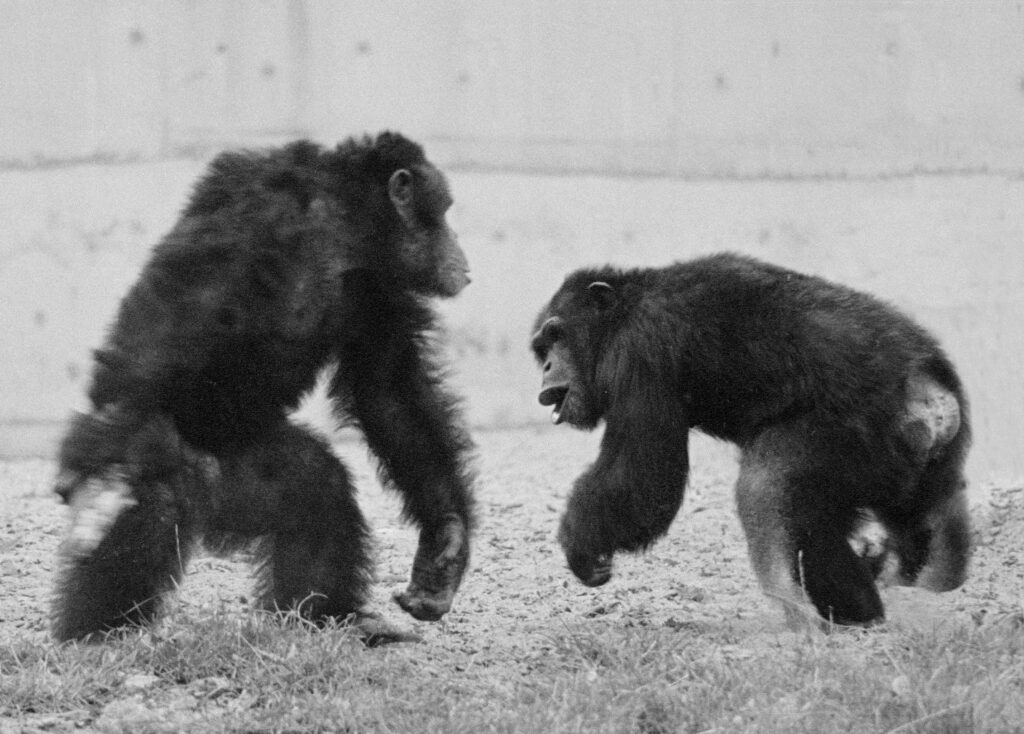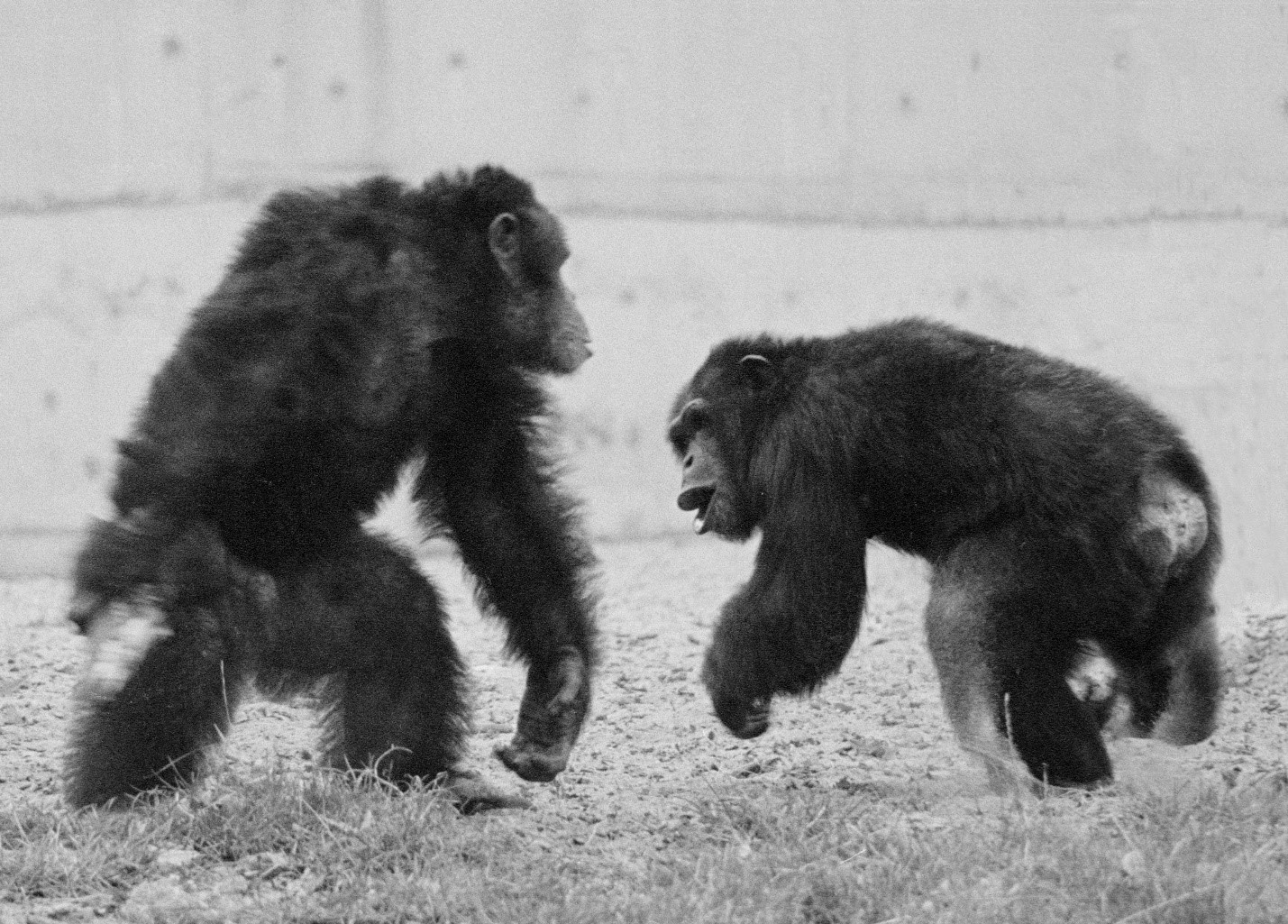First published in 1982, Chimpanzee Politics follows the Arnhem Zoo chimpanzee colony through several power upheavals and ensuing social reconciliations over a period of several years. The strength of the book, however, lies in the detailed descriptions of everyday life in the colony, which in and of itself is rife with complex social interactions and relationships to rival even the most salacious of television dramas. As the title suggests, power (and to a lesser extent the sexual privileges it affords) are major topics of discussion, and yet in this case ‘power’ is derived not from conflict alone but also from reconciliation and peacekeeping. Tool use is often cited as a primary indicator of the intelligence of our closest nonhuman relative, and yet social intelligence may prove much more telling.

I was first inspired to read this book after it was mentioned in a TEDTalk by Frans de Waal, the author and world-renowned primatologist and ethologist. His TEDTalk, which I’ve linked below, is a condensed explanation of the inner workings of chimpanzee dominance hierarchies and an exploration of the stereotypical “alpha male”, mostly using chimp examples from his own observations and research. Chimpanzee Politics is an expansion on this topic and much more. The parallels with humans and human politics however are truly eerie. While primarily a work of ethology, Chimpanzee Politics is written in a way that appeals to both scientists and the layperson alike.
The book opens with an introduction to the Arnhem colony, as well as descriptions of chimpanzee behavior, communication, expressions, and researcher interpretations of these. Also included are numerous photographs and illustrations by the author, and a few easy to follow graphs. The first chapter profiles the main actors of the book, the chimps themselves, and provides insight into their backgrounds and individual personalities, as well as which other chimps they often associate with. All members of the colony interact with each other, and yet as with any group, some relationships are more friendly, and some are more adversarial. The ability to recognize individuals and your relationship with them is crucial to maintaining a stable social hierarchy. The females tend to have more stable relationships over time, while the relationships between the males are not as static. Whether chimps have a biological drive for status and the privileges it brings is discussed in later chapters, but it seems clear that they do, whether this is consciously realized or not.

While the main players are three adult males, the females are not neutral background props. Instead they hold tremendous sway over the outcomes of each power struggle. No male comes to power without female support. Chimpanzees live in male dominated societies, but females also have their own dominance hierarchies within the colony. In the early years, a female named Mama was the alpha over the entire colony. This is rare in chimp societies. Once the three adult males were introduced, Mama lost her alpha status, although not without putting up a fight. Afterwards, once the new alpha male became established, Mama remained a vital and highly respected group member and the highest-ranking female in the colony. As Frans de Waal notes, “none of the males can ignore Mama” and her reconciliatory talents. After disputes it was a common occurrence for other chimps to seek solace and protection in Mama’s arms. Females are also crucial political mediators, acting as neutral third parties and initiating reconciliations between stubborn feuding males.

One of the primary takeaways from Chimpanzee Politics is the importance of coalition formation in achieving and maintaining alpha status. The picture above shows the three adult male chimpanzees of the colony, Yeroen, Nikkie, and Luit. The individual seen in the center is Nikkie, the alpha male of the colony at this time, and yet he is actively grooming the male on the left, which is Yeroen, the oldest male of the colony. The old male Yeroen is in a coalition with the alpha male Nikkie. In fact, the support of Yeroen was essential for Nikkie to gain his alpha status. Here Nikkie is grooming Yeroen, an affiliative behavior. Alpha male chimpanzees recognize the need to keep their supporters happy. Interestingly, the male on the right of the picture, Luit, is individually the strongest of the three males, and yet Luit is not the alpha male. To reach the highest status position you need support and allies, not merely physical strength. This is not unlike human politicians who need the unwavering support of a political base to win campaign bids.

The final chapter concludes with an analysis of the broader mechanisms and the social significance of each. Chimpanzees can form coalitions and follow changing social dynamics due, in part, to the mechanisms of reciprocity, strategic intelligence, and triadic awareness, all of which are discussed at length in this final chapter. Reciprocity can be thought of as a mutually beneficial exchange. When you give a friend a birthday gift, you are practicing reciprocity. This is a mutually beneficial behavior that reinforces affiliative bonds and cements relationships. Alpha males and those on the ‘campaign trail’ to become alpha males display a great deal of reciprocity and other affiliative actions. Alpha males distribute food and break up fights impartially among other group members. They behave as “comforter-in-chief.” Conflicts may be part of the status quo, but reciprocity and similar behaviors are what keep an alpha male in power.
Strategic intelligence is important in the tactical aspects of coalition formations. When a male decides to try to achieve alpha status, he must first be aware of existing coalitions and strategically test the alliances within them. Frans de Waal explains this using an example from social psychology known as ‘minimal winning coalitions.’ In experimental game play, when the weakest of three players has the option of joining with the strongest or with the middle party, the weakest will opt to align themselves with the middle player, not the strongest. In the colony, after losing alpha status to Luit, Yeroen aligned himself not with Luit the new alpha, but with Nikkie instead. Luit, being the highest status and individually the strongest male did not need Yeroen’s support, but Nikkie did. Nikkie, together with Yeroen, formed a coalition that was able to eventually dethrone Luit, making Nikkie the new alpha and improving Yeroen’s status in the group. Did Yeroen look rationally at the situation and imagine possible future outcomes? Frans de Waal suspects chimps as being capable of this, and yet without being inside Yeroen’s head this is difficult to prove.

The third principle is triadic awareness, which could be described as the ability to recognize not only your own relationship with others, but also the relationships between other group members existing outside yourself. Frans de Waal explains this as “the ability of individual A in his relationship with B and C not only to be aware and allow for his own relationship with both B and C individually (A – B and A – C), but also to be aware of and allow for the relationship B – C.” Coalition formation, mediation of conflicts, and reconciliation would all be impossible without triadic awareness. All three mechanisms should sound familiar to those with any background in studying politics. In fact, the book makes several philosophical comparisons to the Machiavellian nature of the three adult male’s behaviors. I agree that their behavior can be considered ‘political’, especially using the basic definition of “who gets what, when and how” as Frans de Waal describes it. Truly our own political systems are much more complex, but the basic underpinnings, the strategizing, the making and breaking of coalitions, the rivalries and alliances, and the eventual reconciliations while very human, also exist in our closest nonhuman primate relatives.
In the end, the balance between cycles of conflict and reconciliation is essential to maintaining social stability. The book concludes that “human beings should regard it as an honor to be classed as political animals.”
Overall, the book is a page-turner and a good introduction to ethology and chimpanzee behavior. Those interested in human behaviors and in the origins of politics may also enjoy this read.
Here’s the link to Frans de Waal’s TEDTalk “The Surprising Science of Alpha Males.” Check it out! https://www.youtube.com/watch?v=BPsSKKL8N0s
Kate Keller (McElvaney)
